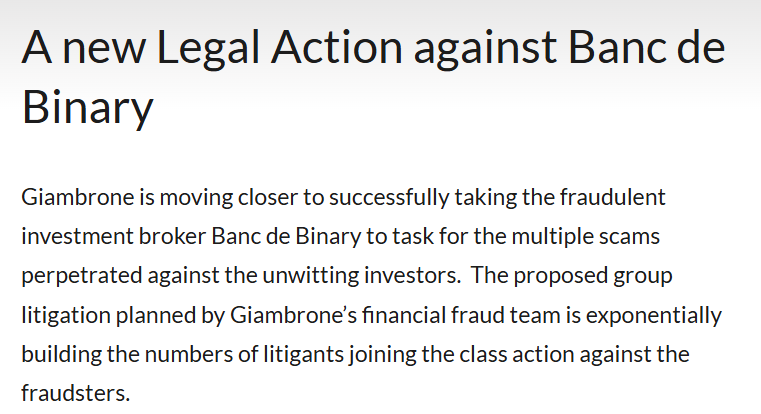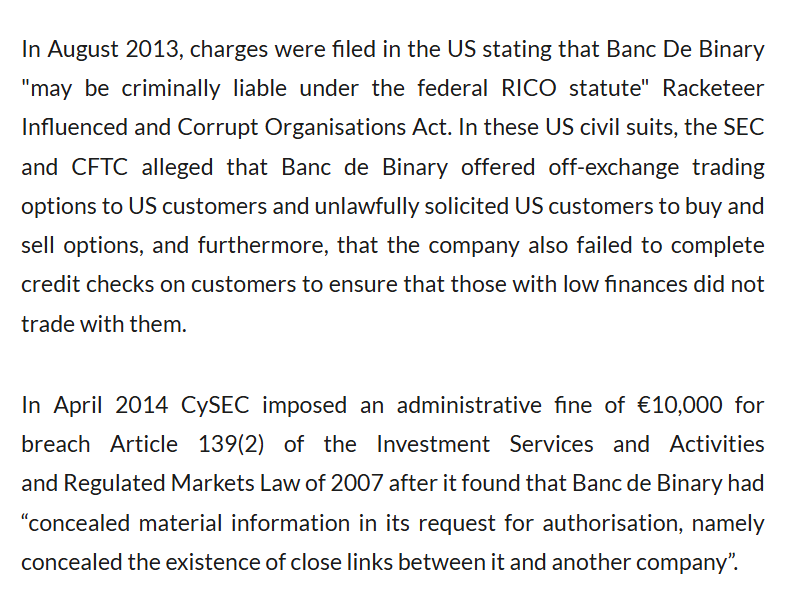- Home
- Investigations
- Banc De Binary

Banc De Binary
- Investigation status
- Ongoing
We are investigating Banc De Binary for allegedly attempting to conceal critical reviews and adverse news from Google by improperly submitting copyright takedown notices. This includes potential violations such as impersonation, fraud, and perjury.
- Alias
-
Banc De Binary Ltd.
- Company
-
Banc De Binary
- City
-
Limassol
- Country
-
Cyprus
- Allegations
-
Fraud

- https://lumendatabase.org/notices/44139510
- https://lumendatabase.org/notices/44139511
- https://lumendatabase.org/notices/44139512
- https://lumendatabase.org/notices/44139513
- https://lumendatabase.org/notices/43656270
- https://lumendatabase.org/notices/43625267
- https://lumendatabase.org/notices/43625053
- https://lumendatabase.org/notices/43629307
- https://lumendatabase.org/notices/43629238
- https://lumendatabase.org/notices/43709090
- https://lumendatabase.org/notices/43681893
- https://lumendatabase.org/notices/43567532
- https://lumendatabase.org/notices/43567231
- https://lumendatabase.org/notices/43532235
- https://lumendatabase.org/notices/43529796
- https://lumendatabase.org/notices/43534210
- https://lumendatabase.org/notices/43533812
- https://lumendatabase.org/notices/43521109
- https://lumendatabase.org/notices/43520593
- https://lumendatabase.org/notices/43533538
- https://lumendatabase.org/notices/43474440
- https://lumendatabase.org/notices/43427340
- https://lumendatabase.org/notices/43427250
- https://lumendatabase.org/notices/43321876
- https://lumendatabase.org/notices/43599760
- https://lumendatabase.org/notices/43599492
- https://lumendatabase.org/notices/43326409
- https://lumendatabase.org/notices/43599760
- https://lumendatabase.org/notices/43518055
- https://lumendatabase.org/notices/43599492
- https://lumendatabase.org/notices/43533538
- https://lumendatabase.org/notices/43427250
- https://lumendatabase.org/notices/42958724
- https://lumendatabase.org/notices/42949386
- https://lumendatabase.org/notices/42949377
- https://lumendatabase.org/notices/42949287
- https://lumendatabase.org/notices/42948768
- https://lumendatabase.org/notices/42948627
- https://lumendatabase.org/notices/42805135
- https://lumendatabase.org/notices/42829872
- https://lumendatabase.org/notices/42802962
- https://lumendatabase.org/notices/42947361
- https://lumendatabase.org/notices/42946110
- https://lumendatabase.org/notices/33497917
- https://lumendatabase.org/notices/30571076
- https://lumendatabase.org/notices/30044306
- https://lumendatabase.org/notices/30044306
- https://lumendatabase.org/notices/29902599
- https://lumendatabase.org/notices/44400765
- https://lumendatabase.org/notices/44398187
- https://lumendatabase.org/notices/44398140
- https://lumendatabase.org/notices/44308952
- https://lumendatabase.org/notices/43709090
- https://lumendatabase.org/notices/44139510
- https://lumendatabase.org/notices/43656270
- https://lumendatabase.org/notices/43629389
- https://lumendatabase.org/notices/43629307
- https://lumendatabase.org/notices/43629238
- https://lumendatabase.org/notices/43626813
- https://lumendatabase.org/notices/43567532
- https://lumendatabase.org/notices/43567231
- https://lumendatabase.org/notices/43533812
- https://lumendatabase.org/notices/43321876
- https://lumendatabase.org/notices/43532235
- https://lumendatabase.org/notices/43529796
- https://lumendatabase.org/notices/43243758
- https://lumendatabase.org/notices/43521109
- https://lumendatabase.org/notices/43520593
- https://lumendatabase.org/notices/43198816
- https://lumendatabase.org/notices/43213113
- https://lumendatabase.org/notices/43196776
- https://lumendatabase.org/notices/43210885
- https://lumendatabase.org/notices/43210860
- https://lumendatabase.org/notices/43190416
- https://lumendatabase.org/notices/43092856
- https://lumendatabase.org/notices/43175723
- https://lumendatabase.org/notices/43145053
- https://lumendatabase.org/notices/43175668
- https://lumendatabase.org/notices/43175558
- https://lumendatabase.org/notices/43139624
- https://lumendatabase.org/notices/43164812
- https://lumendatabase.org/notices/43126789
- https://lumendatabase.org/notices/30214849
- https://lumendatabase.org/notices/30214853
- https://lumendatabase.org/notices/30176206
- https://lumendatabase.org/notices/30399720
- https://lumendatabase.org/notices/30571084
- https://lumendatabase.org/notices/30214850
- https://lumendatabase.org/notices/30045179
- https://lumendatabase.org/notices/30214863
- https://lumendatabase.org/notices/29883869
- https://lumendatabase.org/notices/29935904
- https://lumendatabase.org/notices/29974742
- https://lumendatabase.org/notices/30007993
- https://lumendatabase.org/notices/30399715
- https://lumendatabase.org/notices/29935920
- https://lumendatabase.org/notices/44368121
- https://lumendatabase.org/notices/43681893
- https://lumendatabase.org/notices/43534210
- https://lumendatabase.org/notices/43533538
- https://lumendatabase.org/notices/43298897
- https://lumendatabase.org/notices/43145402
- https://lumendatabase.org/notices/43139619
- https://lumendatabase.org/notices/43139508
- https://lumendatabase.org/notices/43135738
- https://lumendatabase.org/notices/43474440
- https://lumendatabase.org/notices/43427250
- https://lumendatabase.org/notices/43175688
- https://lumendatabase.org/notices/43175581
- https://lumendatabase.org/notices/43141242
- https://lumendatabase.org/notices/43164466
- https://lumendatabase.org/notices/43124956
- https://lumendatabase.org/notices/43122664
- https://lumendatabase.org/notices/43108637
- https://lumendatabase.org/notices/43107568
- https://lumendatabase.org/notices/43106206
- https://lumendatabase.org/notices/43093739
- https://lumendatabase.org/notices/30379092
- https://lumendatabase.org/notices/30214862
- https://lumendatabase.org/notices/43254782
- https://lumendatabase.org/notices/47211792
- https://lumendatabase.org/notices/45957680
- https://lumendatabase.org/notices/45957839
- https://lumendatabase.org/notices/43770220
- https://lumendatabase.org/notices/45956429
- https://lumendatabase.org/notices/45956353
- https://lumendatabase.org/notices/44425954
- https://lumendatabase.org/notices/43602225
- Aug 27 2024
- Sep 3 2024
- Sep 6 2024
- Aug 7 2024
- Aug 10 2024
- Aug 8 2024
- Aug 4 2024
- Aug 2 2024
- Aug 3 2024
- Jul 31 2024
- Jul 29 2024
- Jul 25 2024
- Aug 5 2024
- Jul 11 2024
- Jul 10 2024
- Jul 4 2024
- Jul 5 2024
- Apr 14 2023
- Feb 3 2023
- Dec 23 2022
- Dec 12 2022
- Aug 6 2024
- Jul 22 2024
- Jul 20 2024
- Jul 21 2024
- Jul 16 2024
- Jul 19 2024
- Jul 18 2024
- Jul 17 2024
- Jan 6 2023
- Jan 3 2023
- Jan 22 2023
- Dec 11 2022
- Dec 15 2022
- Dec 18 2022
- Dec 20 2022
- Sep 5 2024
- Jul 24 2024
- Jan 20 2023
- Jul 23 2024
- Dec 15 2024
- Nov 04 2024
- Aug 12 2024
- Sep 07 2024
- Aug 05 2024
- Sep 05 2024
-
Kembly Media Corp.
-
Kambodia Corp
-
Gregor Media Corp.
-
Kimberly Media International
-
Brisbane Media Co.
-
Habib LLC
-
Raton Law & Co.
-
Xan Media Corporation
-
Sherawat Media Corp.
-
Hills Media Inc.
-
Grant Media Corp.
-
Tinker Media Corp.
-
Jones Media Corp.
-
Wadhwa Media Corp.
-
Wells Media Corp.
-
Lenger & Co.
-
Signature Media LLC
-
Lime Media Corp.
-
Duke Media Corp.
-
Burgs & Co.
-
Mcdonald Media Corporation
-
Lancaster Media Corp.
-
Lamer Media Company
-
Rathambore Media Corp.
-
Lamba Law & Co.
-
Dua & Co.
-
Atkinson Law & Co.
-
HYP Media Corp.
-
Frenchie Media Corp.
-
SY Media Syndicate
-
Radhe Inc.
-
Fox & Co.
-
BB International
-
Fernandez Corp.
-
Licono Media Corp.
-
Brecker Media Co.
-
Arellano Media
-
Rother Media Network
-
MkM Media Group
-
Will and Corp
-
Simran and Co
-
Magnuma
-
Kimberly Media Corp.
-
Luckman Media Corp.
-
Sherawat Media Corp.q
-
Yang Media Corp.
-
Sir Issac Cameron
-
AK Law & Co.
-
Peters & Collins Co.
-
JLS Media Corp.
-
JB Law & Co.
-
Brown Media Inc.
-
Jaison & Co Ltd.
-
AR Media Enterprises
-
Lacey Law & Co.
-
Mocambo Law & Co.
-
HM Law & Co.
-
James Henick
-
Das Media Networks
-
Walia Media Corp.
-
Carlos Law & Co.
-
Lee Corporates LLC Asia
-
Dusan and Co
-
Jeans and Co
-
Will and Co
-
Lionel and Corp
-
Carter LAWFIRM LLC Asia
-
PP Sain Corp
-
The Johns Corp LLC
-
Sanjan LLC
-
Dicardo
-
Jackson Media Corp.
-
Henrick Media Corp.
-
AD Law & Co.
-
HT Law & Co. LLP
-
AS Law Corp.
-
Ranthom Law & Co. LLP
-
Lorenzo Louis Media Corp. LLC
-
Litz Media Corp.
-
Mathur Media Corp.
-
KGI International
-
CBR Media
-
HUI Media Corp.
-
ARIM Media Corp.
-
AMI Media LLP
-
JRL Infotech LLP
-
Michael and Co
-
HR Media Corp
-
Malom Media Corporation
-
Jackson & Co.
-
Belfort Media & Co.
-
Hasbulla Media Corp.
-
Kerenski Media Corp.
-
Smith & Co.
-
Lucas Media Corp.
-
Chaturwedi & Co.
-
https://jewishnewsherald.com/2024/01/27/bank-pays-11-million-for-illegal-options-sales/
-
http://timesofboston.com/2021/09/03/sec-returns-investor-funds-from-unregistered-broker/
-
https://timesofcolumbus.com/2014/09/06/sec-exch-commn-v-banc-de-binary/
-
https://timesofcolumbus.com/2018/09/06/exclusive-giambrone-exploring-lawsuit-against-banc-de-binary
-
https://italynewsboard.com/2017/08/08/%D7%94%D7%9E%D7%9C%D7%97%D7%9E%D7%94%D7%91%D7%90%D7%95%D7%A4%D7%A6%D7%99%D7%95%D7%AA%D7%94%D7%91%D7%99%D7%A0%D7%90%D7%A8%D7%99%D7%95%D7%AA-banc-de-b%D7%A1%D7%95%D7%92%D7%A8%D7%AA-%D7%90%D7%AA/
-
Major Israeli binary firm, Banc de Binary, lays off employees, said to be shutting down
-
Exclusive: Giambrone Exploring Lawsuit against Banc de Binary
-
-
https://georgianewsboard.com/wp-content/uploads/2024/08/enforderbancdebinary022916-2.pdf
-
- https://hendirkcnews.xyz/2017/02/04/sec-returns-investor-funds-from-unregistered-broker/
-
https://moscownationalherald.com/2016/02/02/bank-pays-11-million-for-illegal-options-sales/
- https://neworleansgazette.org/?p=490
- https://hendirkcnews.xyz/2016/03/03/release-number-7336-16/
- https://neworleansgazette.org/?p=208
- https://losangelesreporting.org/?p=713
-
https://calinewsers.com/2016/02/25/bank-pays-11-million-for-illegal-options-sales/
-
https://www.nytimes.com/2024/08/04/world/europe/russia-undercover-prisoner-swap.html
-
https://www.businessdailyafrica.com/bd/corporate/shipping-logistics/car-importers-win-as-kra-switches-to-new-tax-system-4715294
-
https://bangkoknewsstand.com/2024/07/24/page-not-found/
-
https://qatarherald.org/?p=33
-
https://qatarherald.org/?p=39
-
https://qatarherald.org/?p=31
-
https://qatarherald.org/?p=37
-
https://abudhabinews.org/2014/07/10/wikipedia-vs-banc-de-binary-a-3-year-battle-against-binary-options-fake-news/
-
https://abudhabinews.org/2016/01/10/israel-olympic-committee-takes-sponsorship-cash-from-binary-options-millionaire/
-
https://newyorkjointers.com/2020/07/04/this-page-is-temporarily-unavailable/
-
https://cambdrigenewsc.com/2016/03/04/banc-de-binary-ltd-et-al/
-
https://botswanaherald.com/?p=262
-
https://www.cftc.gov/PressRoom/PressReleases/7336-16
-
https://www.deccanlive.in/2017/01/the-unethical-sellers-of-dreams.html
-
https://krispellotimes.com/2016/03/09/release-number-7336-16/
-
https://iraqherald.org/2016/02/20/sec-returns-investor-funds-from-unregistered-broker/
-
https://iraqherald.org/2018/01/20/wanna-go-large-sir-burger-flipping-sec-impostors-pretend-to-help-banc-de-binary-fraud-victims/
-
https://germannewsherald.com/?p=137
-
https://bocaratonlocalherald.com/2024/07/19/major-israeli-binary-firm-banc-de-binary-lays-off-employees-said-to-be-shutting-down/
-
https://jewishnewsherald.com/2014/03/18/sec-exch-commn-v-banc-de-binary/
-
https://bocaratonlocalherald.com/2017/01/01/banc-de-binary/
-
https://cambdrigenewsc.com/2017/01/01/exclusive-giambrone-exploring-lawsuit-against-banc-de-binary/
-
https://www.deccanlive.in/2017/01/banc-de-binary.html
-
https://www.forexfactory.com/news/581671-tony-hetherington-now-banc-de-binary-is-hit
-
https://www.deccanlive.in/2017/05/wikipedia-vs-banc-de-binary-3-year.html
-
https://timesofcleveland.com/2016/03/05/release-number-7336-16/
-
https://jewishnewsherald.com/2016/03/16/release-number-7336-16/
-
https://germannewsherald.com/?p=58
-
https://www.jpost.com/israel-news/sports/olympic-committee-of-israel-announces-medal-rewards-617301
-
-
https://miaminewspost.com/banc-de-binary-ltd-et-al/
-
https://miaminewspost.com/oren-shabat-laurent/
-
-
https://miaminewspost.com/the-rise-and-fall-of-a-giant-banc-de-binary-timeline/
-
https://miaminewspost.com/wikipedia-vs-banc-de-binary-a-3-year-battle-against-binary-options-fake-news/
-
https://timesofcleveland.com/2024/05/07/banxsos-link-to-the-banc-de-binary-scam/
-
https://usctrojans.com/news/2024/8/5/-usc2paris-olympics-recap-day-11-micah-christenson-helps-usa-mens-volleyball-advance-to-semifinals.asp
-
http://courthousenews.com/bank-pays-11-million-for-illegal-options-sales
-
http://www.247wallst.com/investing/2016/03/10/sec-returns-investor-funds-from-unregistered-broker
-
https://casetext.com/case/sec-exch-commn-v-de-binary
-
http://financemagnates.com/binary-options/brokers/exclusive-giambrone-exploring-lawsuit-banc-de-binary
- https://www.financemagnates.com/binary-options/brokers/exclusive-giambrone-exploring-lawsuit-banc-de-binary/
-
http://themarker.com/markets/2017-01-10/tyarticle/0000017f-e730-da9b-a1ff-ef7fad0f0000
-
http://cftc.gov/sites/default/files/idc/groups/public/@lrenforcementactions/documents/legalpleading/enforderbancdebinary022916.pdf
-
http://timesofisrael.com/major-israeli-binary-firm-banc-de-binary-lays-off-employees-said-to-be-shutting-down
- https://financefeeds.com/wanna-go-large-sir-burger-flipping-sec-impostors-pretend-help-banc-de-binary-fraud-victims
-
https://www.giambronelaw.com/site/news-articles-press/library/articles/a-new-legal-action-against-banc-de-binary
-
https://www.thisismoney.co.uk/money/experts/article-2631267/TONY-HETHERINGTON-I-lost-27-000-risky-trader-banned-US.html
-
https://www.timesofisrael.com/wikipedia-vs-banc-de-binary-a-3-year-battle-against-binary-options-fake-news
-
https://www.timesofisrael.com/israel-olympic-committee-takes-sponsorship-cash-from-binary-options-millionaire
-
https://sec.gov/divisions/enforce/claims/docs/banc-de-binary-second-amended-complaint-031114.pdf
-
https://www.sec.gov/litigation/litreleases/lr-23481
-
https://www.offshorealert.com/tag/oren-shabat
-
https://www.onestopbrokers.com/2016/03/10/cftc-banc-de-binary-ltd-et-binary-options-ltd-among-binary-optionsfirms-ordered-pay-9-million-penalty
- https://mg.co.za/article/2017-01-13-00-the-unethical-sellers-of-dreams
-
https://www.hedgeweek.com/2016/03/10/237345/banc-de-binary-et-binary-options-bo-systems-bdb-services-and-oren-shabat-laurent-p
-
https://mondovisione.com/media-and-resources/news/sec-money-returning-to-investors-harmed-by-unregistered-broker
-
https://www.sec.gov/enforcement-litigation/litigation-releases/lr-23481
-
https://www.onestopbrokers.com/tag/oren-shabat-laurent
-
https://www.ft.com/content/7b4c13b2-d7fd-11e6-944b-e7eb37a6aa8e/
-
https://digitalcoinnews.net/coin/news-54985671/
-
https://cftc.gov/PressRoom/PressReleases/7336-16
- http://thatsucks.com/the-rise-and-fall-of-a-giant-banc-de-binary-timeline
Evidence Box and Screenshots






2 Alerts on Banc De Binary
- RED FLAGS
Banc De Binary: Binary Options Fraud Hits Global Investors
Banc De Binary scam, a fraudulent binary options scheme that defrauded thousands globally. This in-depth article exposes its deceptive practices, multimillion-dollar f...
Visit Link- RED FLAGS
Banc De Binary: A Look at Its Global Binary Trading Activ...
Banc De Binary scam: illegal binary options trading that defrauded U.S. investors of millions, leading to CFTC fines over $9M and permanent bans. Explore victim storie...
Visit LinkHow Was This Done?
The fake DMCA notices we found always use the ? back-dated article? technique. With this technique, the wrongful notice sender (or copier) creates a copy of a ? true original? article and back-dates it, creating a ? fake original? article (a copy of the true original) that, at first glance, appears to have been published before the true original.


What Happens Next?
The fake DMCA notices we found always use the ? back-dated article? technique. With this technique, the wrongful notice sender (or copier) creates a copy of a ? true original? article and back-dates it, creating a ? fake original? article (a copy of the true original) that, at first glance, appears to have been published before the true original.
01
Inform Google about the fake DMCA scam
Report the fraudulent DMCA takedown to Google, including any supporting evidence. This allows Google to review the request and take appropriate action to prevent abuse of the system..
02
Share findings with journalists and media
Distribute the findings to journalists and media outlets to raise public awareness. Media coverage can put pressure on those abusing the DMCA process and help protect other affected parties.
03
Inform Lumen Database
Submit the details of the fake DMCA notice to the Lumen Database to ensure the case is publicly documented. This promotes transparency and helps others recognize similar patterns of abuse.
04
File counter notice to reinstate articles
Submit a counter notice to Google or the relevant platform to restore any wrongfully removed articles. Ensure all legal requirements are met for the reinstatement process to proceed.
05
Increase exposure to critical articles
Re-share or promote the affected articles to recover visibility. Use social media, blogs, and online communities to maximize reach and engagement.
06
Expand investigation to identify similar fake DMCAs
Widen the scope of the investigation to uncover additional instances of fake DMCA notices. Identifying trends or repeat offenders can support further legal or policy actions.

Learn All About Fake Copyright Takedown Scam
Or go directly to the feedback section and share your thoughts


Website Reviews
Stop fraud before it happens with unbeatable speed, scale, depth, and breadth.
Recent Reviews

Cyber Investigation
Uncover hidden digital threats and secure your assets with our expert cyber investigation services.
Recent Reviews

Threat Alerts
Stay ahead of cyber threats with our daily list of the latest alerts and vulnerabilities.
Recent Reviews

Client Dashboard
Your trusted source for breaking news and insights on cybercrime and digital security trends.
Recent Reviews
Lincoln Lim...
Fake DMCA Investigation
Richard Liebowitz
Fake DMCA Investigation
Lee Kindlon
Fake DMCA Investigation
User Reviews
Discover what real users think about our service through their honest and unfiltered reviews.
1.7
Average Ratings
Based on 1 Ratings
Xavier Fox
Major allegations against Banc De Binary include regulatory violations and bans, misleading marketing practices, customer complaints, and fraud allegations. The company faced scrutiny from multiple regulatory bodies worldwide, including the U.S. SEC, which charged it with illegally selling binary options...
12
12
Whitney Evans
Banc De Binary, a now-defunct binary options trading platform, has been embroiled in numerous controversies, allegations, and adverse news stories throughout its operational history. These issues have significantly tarnished its reputation, raising questions about its business practices, regulatory compliance, and...
12
12
Victor Diaz
The company has faced scrutiny from multiple regulatory bodies worldwide, including charges from the U.S. SEC for illegally selling binary options to U.S. investors without proper registration.
12
12
Theresa Cole
Banc De Binary is under investigation for allegedly misusing DMCA takedown notices to suppress critical content, potentially involving impersonation, fraud, and perjury.
12
12
Isaac Wells
They told me my $18,000 would double in weeks but every trade mysteriously failed When I asked questions, they stopped answering and closed the platform on me
12
12
You are Never Alone in Your Fight
Generate public support against the ones who wronged you!
Featured Cyber Investigations
Explore our most impactful cyber investigations, where we uncover coordinated digital deception, expose fraudulent takedown schemes, and reveal the hidden mechanics behind online manipulation.
Lincoln Lim...
Fake DMCA Investigation
Richard Liebowitz
Fake DMCA Investigation
Lee Kindlon
Fake DMCA Investigation
Reag Asset...
Fake DMCA Investigation
Kyaw Ny
Fake DMCA Investigation
M Kamal...
Fake DMCA Investigation
LiteFinance
Fake DMCA Investigation
Hüsnü Falyalı
Fake DMCA Investigation